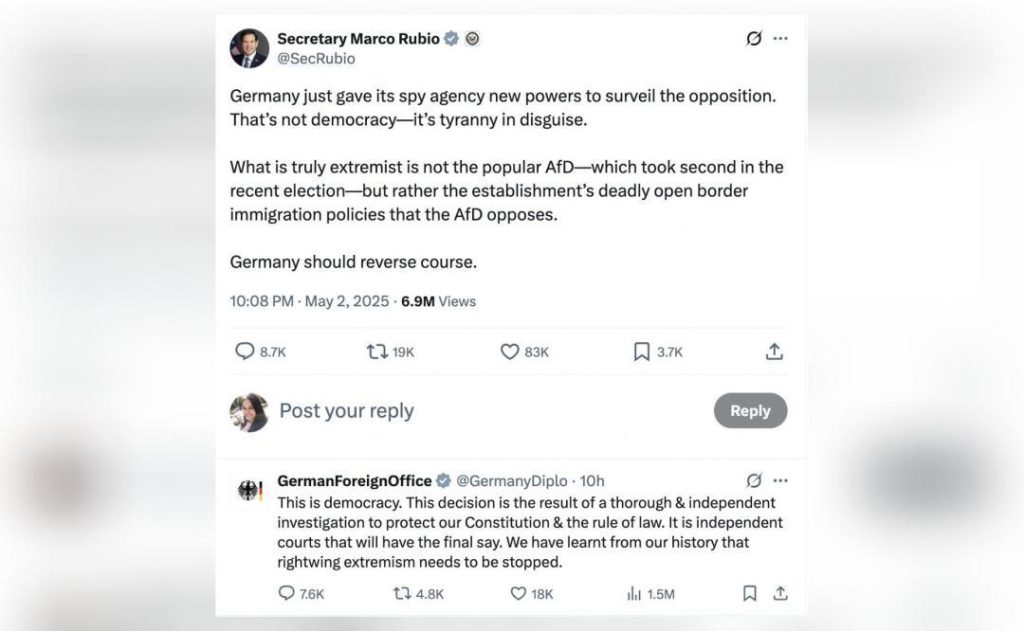
US’ Rubio & German govt clash over AfD party’s ‘extremist’ tag
The diplomatic tensions between the United States and Germany have escalated as US Secretary of State Marco Rubio and the German Foreign Ministry clashed over the extremist designation of the far-right Alternative for Germany (AfD) party. The controversy erupted after Germany’s domestic intelligence agency, the Federal Office for the Protection of the Constitution (BfV), termed the AfD party as “extremist” due to its alleged links with far-right and anti-Semitic groups.
In a sharp rebuke, Rubio accused Germany of enabling “tyranny in disguise” by labeling the AfD party as extremist. He took to Twitter to express his concerns, stating that the decision was “an attack on democracy and the rule of law.” Rubio’s remarks sparked a heated exchange between the US and German governments, with the German Foreign Ministry defending its decision and accusing Rubio of meddling in Germany’s internal affairs.
The controversy began when the BfV published a report stating that the AfD party had ties with extremist groups and posed a threat to Germany’s democratic system. The report cited evidence of anti-Semitic and racist propaganda disseminated by AfD leaders and supporters, as well as the party’s alleged connections to neo-Nazi groups.
In response to the report, the German government took the unprecedented step of designating the AfD party as “extremist.” The decision was seen as a significant escalation in the government’s efforts to combat right-wing extremism and terrorism in the country.
However, Rubio and other US officials took umbrage with the German government’s decision, accusing it of political manipulation and an attack on democratic values. Rubio tweeted, “Germany’s decision to label the AfD as ‘extremist’ is an attack on democracy and the rule of law. It’s an attempt to silence dissenting voices and undermine the legitimacy of democratic institutions.”
The German Foreign Ministry responded to Rubio’s comments, stating that the decision regarding the AfD was the result of a thorough investigation by the BfV to protect Germany’s Constitution. The ministry accused Rubio of meddling in Germany’s internal affairs and warned him against interfering in the country’s democratic processes.
This is not the first time that the US and Germany have clashed over the AfD party. In the past, US officials have expressed concerns about the party’s anti-Semitic and racist rhetoric, as well as its alleged ties to far-right groups. However, the recent designation of the AfD as “extremist” has raised the stakes significantly, with Rubio’s comments marking a significant escalation in the diplomatic tensions between the two countries.
The controversy has also sparked a debate about the role of far-right parties in European politics and the threat they pose to democratic institutions. Critics of the AfD argue that the party’s anti-Semitic and racist rhetoric is being used to normalize hatred and discrimination, and that its presence in the German parliament is a threat to the country’s democratic system.
On the other hand, supporters of the AfD argue that the party is a legitimate political force that is fighting against what they see as the erosion of German identity and culture. They argue that the party’s anti-immigrant and anti-EU rhetoric is a response to the perceived challenges posed by mass migration and globalization.
Despite the controversy, the German government remains committed to its decision to designate the AfD as “extremist.” In a statement, the government said, “The AfD party’s ideology and actions are incompatible with the values of our Constitution and the principles of democracy. We will continue to take all necessary measures to protect our democracy and the rights of all citizens.”
As the controversy continues to unfold, it remains to be seen how the US and Germany will resolve their differences. However, one thing is clear: the designation of the AfD as “extremist” has raised the stakes significantly, and the diplomatic tensions between the two countries are unlikely to subside anytime soon.



